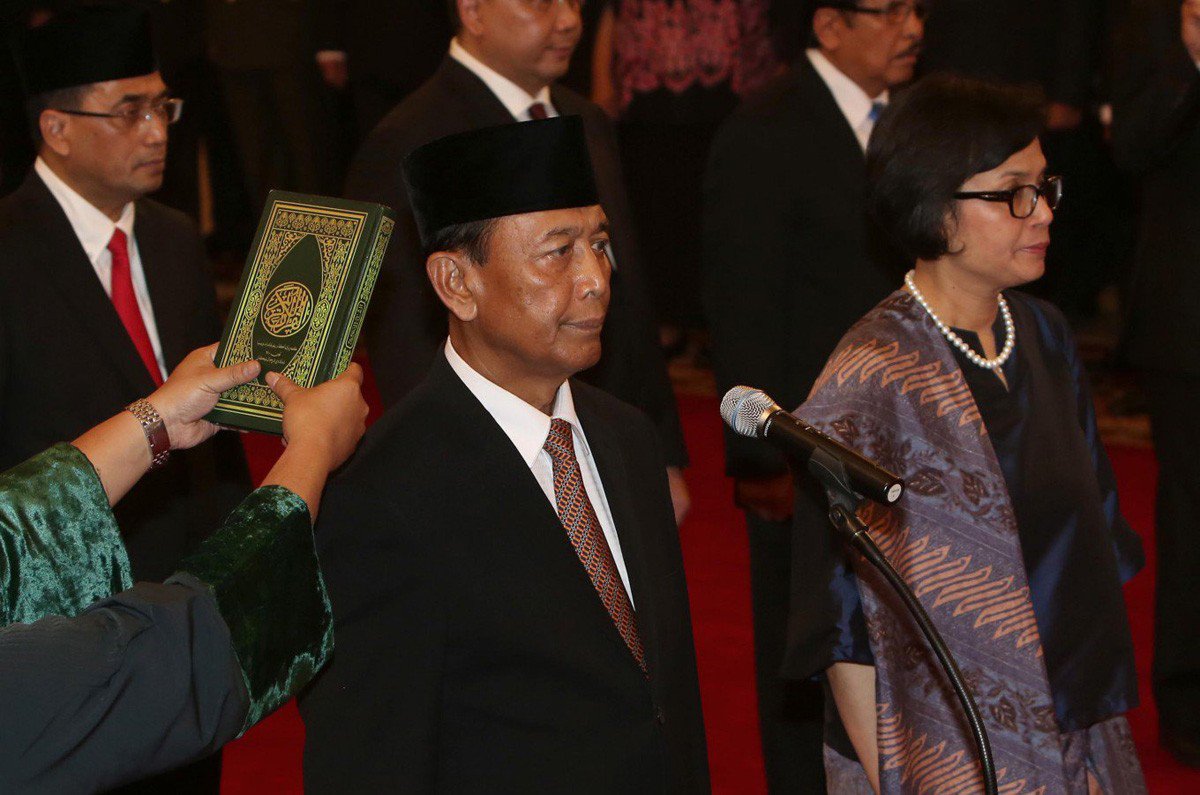
Coordinating Political, Legal and Security Affairs Minister Wiranto (left) and Finance Minister Sri Mulyani Indrawati (right) are sworn in at the State Palace in Jakarta on July 27. (AP Photo/Tatan Syuflana)
Two years after the latest direct presidential election we are still hearing an outcry, despite having a “man of the people” in power.
For those concerned about human rights, this anger has been sparked by at least three developments: the inauguration of an infamous former military commander, Wiranto, in the latest Cabinet; the execution of drug convicts; and the greater application of the Electronic Information and Transactions (ITE) Law.
Public reactions have been markedly different from the early days of President Joko “Jokowi” Widodo’s efforts to stabilize his new government in 2014.
The latest batch of executions took place despite protests inside and outside the country including that expressed by UN Secretary-General Ban Ki-moon. Nationwide, however, protests were minimal as public sentiment largely supports the death penalty.
A further reflection of poor concern for human rights and thus a serious blunder on the part of President Jokowi is the appointment of Wiranto. Though legally free of charges of human rights violation in Indonesia, the UN-created Special Crimes Unit in Timor Leste indicted Wiranto in 2004 for crimes against humanity for atrocities committed in 1999 in then East Timor, which involved Jakarta-backed militia, and issued an arrest warrant for him.
He has denied all charges and has been able to enter politics. He formed the Hanura Party with other retired military generals ahead of the 2004 election but failed to get support from other parties when running with media tycoon Hary Tanoesoedibjo.
It was not surprising when in 2014, together with the Indonesian Democratic Party of Struggle (PDI-P), Hanura supported Jokowi in the presidential election.
So what were the considerations in his appointment as coordinating political, legal and security affairs minister by President Jokowi? Whatever differences they may have, the PDI-P and Hanura share a similar conservative position regarding state sovereignty — with the right to apply the death penalty considered part of that. His appointment was also no surprise to “opposition parties”.
In the Cabinet, strategic positions relating to the economy and politics are shared among three political parties, namely the PDI-P, the NasDem Party and Hanura, while the Golkar Party has also been accommodated. The current attorney general, Prasetyo, currently mandated to carry out executions, is from NasDem.
As Wiranto is seen to be on good terms with hardline Islamists, his current position is hoped to add to the legitimacy of Jokowi’s administration among Islamists. NasDem fully backs the death penalty as part and parcel of the government’s strong stance in applying the law on narcotics.
In general, political parties have no interest in reducing or lifting the death penalty as part of upholding human rights.
Other human rights concerns come from the application of the ITE Law that hinder freedom of expression. According to the independent Southeast Asian Freedom of Expression Network (SafeNet), almost 200 persons have been convicted of defamation and inciting hatred and animosity following postings on social media since the law was passed in 2008.
One recent case involved rights activist Haris Azhar, who spread an interview with executed drug kingpin Freddy Budiman regarding the involvement of the police, National Narcotics Agency officials and members of the military in his drug business. Haris faced the prospect of being taken to trial for defamation.
Following public pressure, however, an independent team was set up to investigate Haris’ story. Earlier the authorities did not bother to look thoroughly at Haris’ statement to find proof and to correct the decaying justice system, and ganged up on him instead.
The latest case was filed by a Bali-based community organization, People’s Struggle Post (Pospera), known to be a strong supporter of Jokowi during his presidential campaign. It reported I Wayan Gendo Suardana, an activist from ForBali, an antireclamation movement in Bali’s Benoa Bay.
The two cases are among many similar ones where the ITE Law is used to quell critics of injustice.
The three developments above show Indonesia is still experiencing a “democratic deficit”, as political scholars say — showing a lack of democratic accountability and control over the decision-making
process.
Our country does not lack formal democracy, with simultaneous general and local elections to take place in a few years’ time. Yet freedom of expression is ignored while elected representatives largely do not mind such blatant abuses of democracy.
No political party has voiced its objection to the appointment of Wiranto, executions or the application of the ITE Law.
On the other hand, public protests against such developments, mostly from civil society organizations, have been channeled through various informal mechanisms. They continue to protest the ITE Law and to remind lawmakers and the President that they were elected on the hopes of millions for a significant change toward better, not worse, human rights compared to that of the New Order. (Irine Hiraswari Gayatri)
______________________________
The writer is a researcher at the Research Center for Politics at the Indonesian Institute of Sciences (LIPI) in Jakarta.

